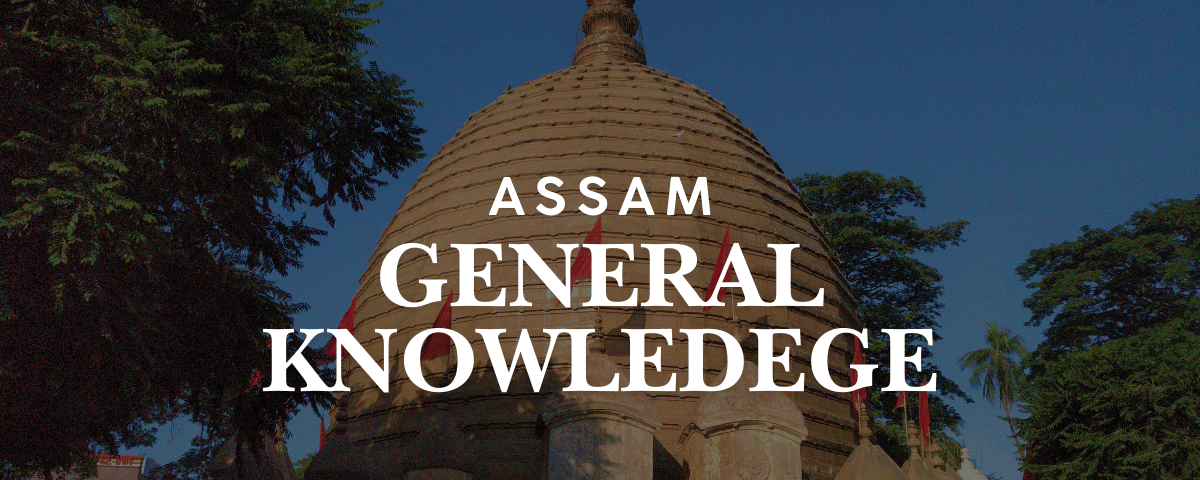Ahom Dynasty Multiple-Choice Questions
The Ahom Dynasty, which ruled Assam for nearly 600 years, stands out as a remarkable period in Indian history, characterized by resilience, cultural development, and unique governance practices. This set of multiple-choice questions is designed to test and expand your knowledge on various aspects of the Ahom Dynasty, from its origins and rulers to its cultural contributions and political strategies. About Ahom Dynasty – Know More
1. Who is considered the founder of the Ahom Kingdom?
A) Rudra Singha
B) Gadadhar Singha
C) Sukapha
D) Kamaleswar Singha
Answer:
C) Sukapha
2. From which region did the Ahoms originate?
A) Yunnan, China
B) Tibet
C) Mongolia
D) Thailand
Answer:
A) Yunnan, China
3. In which year did the Ahoms establish their kingdom in Assam?
A) 1028
B) 1228
C) 1328
D) 1428
Answer:
B) 1228
4. The first capital of the Ahom Kingdom was established at which place?
A) Rangpur
B) Gargaon
C) Charaideo
D) Sibsagar
Answer:
C) Charaideo
5. What does the title “Swargadeo” mean in the Ahom Kingdom?
A) King of Kings
B) Lord of the Heavens
C) Ruler of the Land
D) Divine Protector
Answer:
B) Lord of the Heavens
6. Which Ahom king is known for constructing the Rang Ghar, Asia’s first amphitheater?
A) Sukapha
B) Rudra Singha
C) Gadadhar Singha
D) Jayadhwaj Singha
Answer:
B) Rudra Singha
7. The Ahom Dynasty ruled Assam for nearly how many years?
A) 200 years
B) 400 years
C) 600 years
D) 800 years
Answer:
C) 600 years
8. What system did the Ahoms use to manage their administration?
A) Zamindari system
B) Jagirdari system
C) Paik system
D) Feudal system
Answer:
C) Paik system
9. Which structure is known for its underground tunnels and is an example of Ahom architecture?
A) Talatal Ghar
B) Rang Ghar
C) Charaideo Tombs
D) Sivasagar Palace
Answer:
A) Talatal Ghar
10. How many Ahom kings are said to have ruled Assam?
A) 25
B) 32
C) 42
D) 50
Answer:
C) 42
11. The Ahoms originated from which ethnic group?
A) Aryan
B) Tai
C) Dravidian
D) Mongol
Answer:
B) Tai
12. The Rang Ghar is known as one of Asia’s first:
A) Palaces
B) Fortresses
C) Amphitheaters
D) Temples
Answer:
C) Amphitheaters
13. Who among the following Ahom kings was known for resisting Mughal invasions?
A) Sukapha
B) Rudra Singha
C) Gadadhar Singha
D) Kamaleswar Singha
Answer:
C) Gadadhar Singha
14. Which historical records kept by the Ahoms documented their history?
A) Manuscripts
B) Chronicles
C) Buranjis
D) Epics
Answer:
C) Buranjis
15. The Ahom migration into Assam began around which century?
A) 10th century
B) 11th century
C) 12th century
D) 13th century
Answer:
D) 13th century
16. The Paik system involved citizens contributing which of the following?
A) Taxes
B) Military or labor service
C) Land revenue
D) Monetary donations
Answer:
B) Military or labor service
17. What was the primary purpose of the maidams at Charaideo?
A) Agricultural storage
B) Worship temples
C) Royal burial mounds
D) Fortresses
Answer:
C) Royal burial mounds
18. The Ahom Dynasty defended Assam against which empire multiple times?
A) Maratha Empire
B) Mughal Empire
C) Chola Empire
D) Vijayanagara Empire
Answer:
B) Mughal Empire
19. Sukapha’s approach to ruling Assam involved:
A) Conquest and forced integration
B) Forming alliances with indigenous tribes
C) Isolating his kingdom from other groups
D) Heavy taxation
Answer:
B) Forming alliances with indigenous tribes
20. Which language did the Ahoms contribute to and help develop in Assam?
A) Sanskrit
B) Bengali
C) Assamese
D) Hindi
Answer:
C) Assamese
21. Ahom kings are also known to have promoted which major Assamese festival?
A) Diwali
B) Bihu
C) Holi
D) Durga Puja
Answer:
B) Bihu
22. Who constructed the Talatal Ghar, a significant architectural structure in Assam?
A) Rudra Singha
B) Rajeswar Singha
C) Sukapha
D) Gaurinath Singha
Answer:
A) Rudra Singha
23. The Ahom Dynasty is particularly notable for its contributions to:
A) Maritime trade
B) Music and dance forms
C) Temple architecture in South India
D) Science and technology in western India
Answer:
B) Music and dance forms
24. The Ahoms originally spoke which language before adopting Assamese?
A) Tai
B) Sanskrit
C) Pali
D) Tibetan
Answer:
A) Tai
25. Which Ahom ruler moved the capital from Charaideo to Gargaon?
A) Sukapha
B) Rudra Singha
C) Gadadhar Singha
D) Sukhrungphaa
Answer:
D) Sukhrungphaa
26. Ahom architecture often combines which styles?
A) Mughal and Persian
B) Tai and indigenous Assamese
C) Dravidian and Aryan
D) European and local
Answer:
B) Tai and indigenous Assamese
27. The Ahoms’ resistance to external invasion helped preserve the unique culture of which region?
A) Bengal
B) Gujarat
C) Punjab
D) Assam
Answer:
D) Assam
28. Who among the following was NOT an Ahom king?
A) Rudra Singha
B) Gadadhar Singha
C) Ahilya Bai
D) Sukapha
Answer:
C) Ahilya Bai
29. What was the historical significance of the Buranjis?
A) They were religious texts.
B) They were ancient calendars.
C) They documented Ahom history and records.
D) They were written laws of the Ahom state.
Answer:
C) They documented Ahom history and records.
30. The Ahom Dynasty’s political stability is largely attributed to which of the following?
A) Frequent changes in administration
B) Inheritance through election
C) Use of a unique administrative system like the Paik system
D) Adoption of foreign policies
Answer:
C) Use of a unique administrative system like the Paik system
The Ahom Dynasty reveals a distinctive blend of cultural heritage and strategic governance that left a lasting legacy in Assam. These questions cover key facets of the dynasty's history, helping you gain a deeper understanding of this significant and vibrant period.





